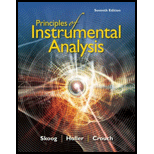
Principles of Instrumental Analysis
7th Edition
ISBN: 9781305577213
Author: Douglas A. Skoog, F. James Holler, Stanley R. Crouch
Publisher: Cengage Learning
expand_more
expand_more
format_list_bulleted
Question
Chapter 26, Problem 26.3QAP
Interpretation Introduction
Interpretation:
In the chromatography, the list of the variables that cause zone broadening needs to be determined.
Concept introduction:
The zone broadening in chromatography is caused due to the several effects. These effects are the diffusion process and the transfer of the solutes between the mobile and stationary.
Expert Solution & Answer
Trending nowThis is a popular solution!

Students have asked these similar questions
Please help with this graph.
ogin - PaymentN
MapQuest
3
Overview - SAP NetW...
Draw the major product of this reaction. Ignore inorganic byproducts.
CI
1. NaBH4
2. H₂O
C Clever | Portal Job Op
Problem
Atoms, Bonds
and Rings
Draw or tap a new bond to
2. Draw the remaining two resonance structures for the carbocation intermediate in the
meta nitration of methyl benzoate AND explain why the meta orientation is preferred.
Hint: how is the placement of the cation favorable after addition of nitronium relative to
the electron withdrawing group? (2 pts)
H NO2
CO₂Me
Chapter 26 Solutions
Principles of Instrumental Analysis
Ch. 26 - Prob. 26.1QAPCh. 26 - Prob. 26.2QAPCh. 26 - Prob. 26.3QAPCh. 26 - Prob. 26.4QAPCh. 26 - Prob. 26.5QAPCh. 26 - Prob. 26.6QAPCh. 26 - Prob. 26.7QAPCh. 26 - Prob. 26.8QAPCh. 26 - Prob. 26.9QAPCh. 26 - Prob. 26.10QAP
Ch. 26 - Prob. 26.11QAPCh. 26 - Prob. 26.12QAPCh. 26 - Prob. 26.13QAPCh. 26 - Prob. 26.14QAPCh. 26 - Prob. 26.15QAPCh. 26 - Prob. 26.16QAPCh. 26 - From the data in Problem 26-14, calculate for...Ch. 26 - Prob. 26.18QAPCh. 26 - Prob. 26.19QAPCh. 26 - Prob. 26.20QAPCh. 26 - Prob. 26.21QAPCh. 26 - Prob. 26.22QAPCh. 26 - Prob. 26.23QAP
Knowledge Booster
Similar questions
- Label all absorptions over 1500 cm-1. Please be specific and mark IR if needed for explanation. Compound OH sp^3 C-H C=O C-O Triglyceridearrow_forwardIdentify the intermediate that is INITIALLY formed in a saponification reaction (hydrolysis of an ester). III -OH H₂O HO OH HO O || A B C III D IV IVarrow_forwardHelp me answer this practice sheet I found for an answer guidearrow_forward
- show the retrosynthesis of this molecule step by step starting with 1,3-dimethoxy benzene H3CO OH OH OCH 3arrow_forwardConsider the reaction of a propanoate ester with hydroxide ion shown below. A series of four alcohol leaving groups were tested to determine which would be the best leaving group. Based on the pKa values of the alcohols, predict which alcohol would produce the fastest hydrolysis reaction. HO FOR A Alcohol I, pKa =16.0 B Alcohol II, pKa =10.0 C Alcohol III, pKa = 7.2 + ROH D Alcohol IV, pKa = 6.6arrow_forwardCurved arrows are used to illustrate the flow of electrons. Using the provided starting and product structures, draw the curved electron-pushing arrows for the following reaction or mechanistic step(s). Be sure to account for all bond-breaking and bond-making steps. :0: NaOH, H₂O 00:4 Na O heat NaO Select to Add Arrows Select to Add Arrows :0: Na a NaOH, H2O :0: NaOH, H2O heat heat Na ONH Select to Add Arrowsarrow_forward
- Curved arrows are used to illustrate the flow of electrons. Using the provided starting and product structures, draw the curved electron-pushing arrows for the following reaction or mechanistic step(s). Be sure to account for all bond-breaking and bond-making steps. H CH3NH3+ :0: :0: HO CH3NH2 HH iSelect to Add Arrows i Select to Add Arrows i HH CH3NH3+ CH3NH2 Select to Add Arrows i CH3NH3 CH3NH2 ايكدا HH Select to Add Arrowsarrow_forwardThe reaction is carried out with gases: A → B + C at 300 K. The total pressure is measured as a function of time (table). If the reaction order is 2, calculate the rate or kinetic constant k (in mol-1 L s¹) Ptotal (atm) 492 676 760 808 861 t(s) 0 600 1200 1800 3000arrow_forwardcan someone give a description of this NMR including whether its a triplt singlet doublet where the peak is around at ppm and what functional group it representsarrow_forward
- 1. Determine the relationship between the following molecules as identical, diastereomers, or enantiomers (6 points, 2 points each). OH OH OH A-A OH HOT HO- ACHN and HO- ACHN OH HO HO ° OH and OH OH SH and ...SHarrow_forward20,0 Complete the electron pushing mechanism to y drawing the necomery unicaciones and carved on for Step 1: Add curved arms for the tint step, traiment with NalilĻ. The Nation 458 Step 2: Added for the second step, inalment with), how the "counterion bar Step 3: Daw the products of the last simplom organic and one incoganic spacient, including all nonbondingarrow_forwardplease provide the structure for this problem, thank you!arrow_forward
arrow_back_ios
SEE MORE QUESTIONS
arrow_forward_ios
Recommended textbooks for you
 Principles of Instrumental AnalysisChemistryISBN:9781305577213Author:Douglas A. Skoog, F. James Holler, Stanley R. CrouchPublisher:Cengage Learning
Principles of Instrumental AnalysisChemistryISBN:9781305577213Author:Douglas A. Skoog, F. James Holler, Stanley R. CrouchPublisher:Cengage Learning EBK A SMALL SCALE APPROACH TO ORGANIC LChemistryISBN:9781305446021Author:LampmanPublisher:CENGAGE LEARNING - CONSIGNMENT
EBK A SMALL SCALE APPROACH TO ORGANIC LChemistryISBN:9781305446021Author:LampmanPublisher:CENGAGE LEARNING - CONSIGNMENT

Principles of Instrumental Analysis
Chemistry
ISBN:9781305577213
Author:Douglas A. Skoog, F. James Holler, Stanley R. Crouch
Publisher:Cengage Learning


EBK A SMALL SCALE APPROACH TO ORGANIC L
Chemistry
ISBN:9781305446021
Author:Lampman
Publisher:CENGAGE LEARNING - CONSIGNMENT